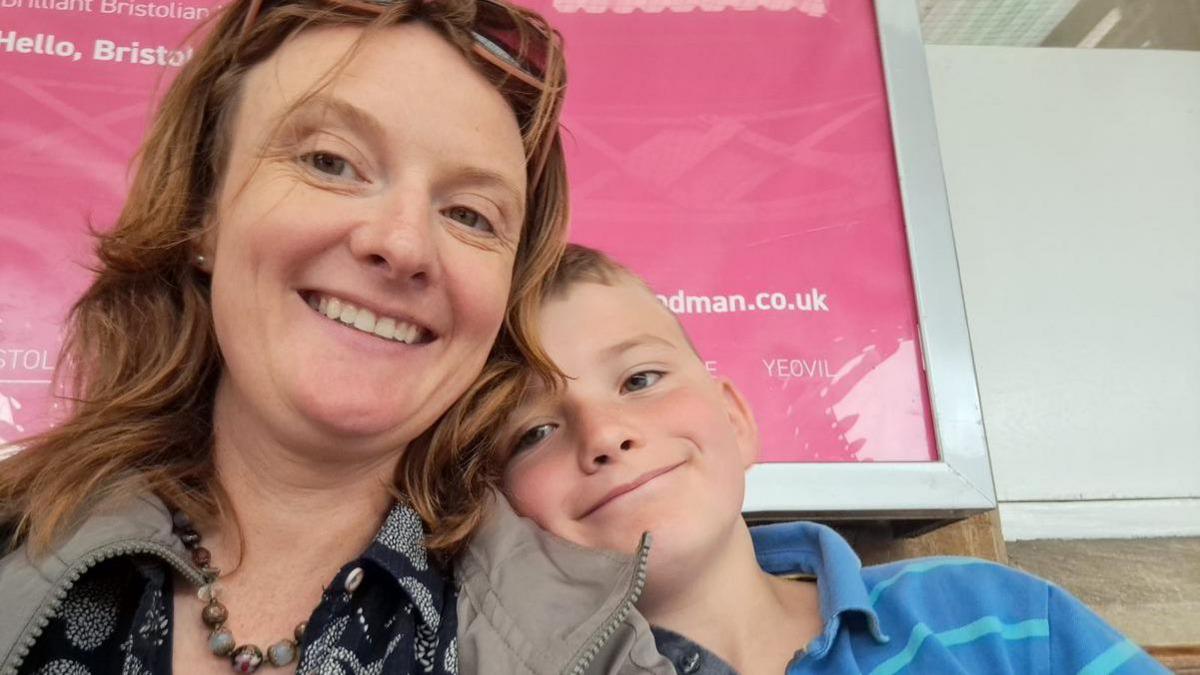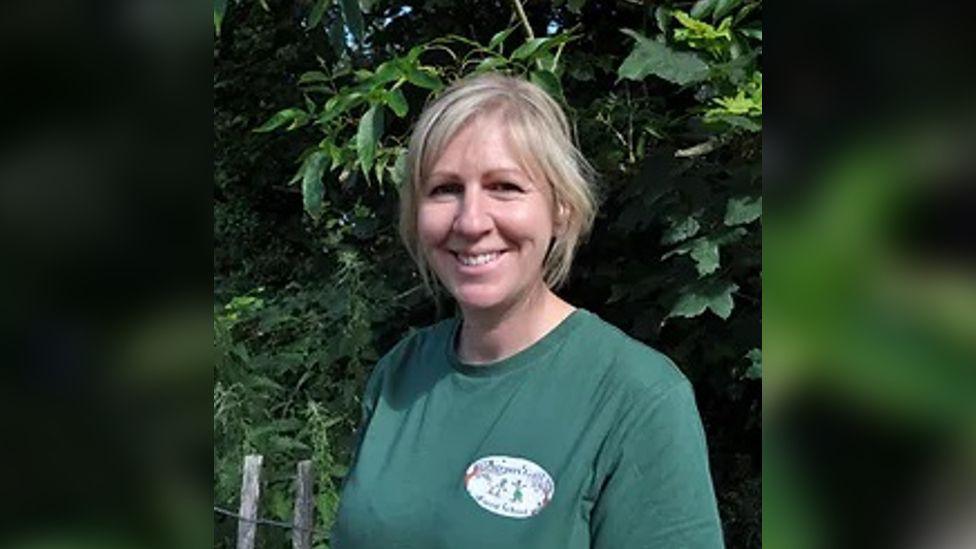How summer became the 'ultimate juggling act'

Families across the area are "feeling the pressure" of the summer holidays
- Published
What does the phrase "six weeks' holiday" mean to you?
As a child, it was likely somewhat synonymous with "freedom" - endless days stretching ahead, free to fill with whatever fun you could find.
For parents it can feel endless, but for very different reasons. With dwindling annual leave, mounting activity costs and ever-squeezed holiday club spaced to contend with, the summer break can be a huge source of pressure.
From parents of teenagers to pre-schoolers, we spoke to parents living in the west of England about how they cope with the holidays.

Mother-of-six Elspeth described organising the family as a "full-time job"
Mum-of-six Elspeth Cordray, 43, described the summer holidays as the "ultimate juggling act", balancing childcare demands with her job with a software company.
With her children aged seven to 17, she told the BBC how she had spent years navigating holiday clubs, working from home, family support, as well as home educating for some time, to keep everyone organised.
"I literally don't do anything in the summer without my calendar in front of me.
"Sorting everyone out is more or less a part-time job in itself," she said.
Working remotely "makes it all possible" she said, but that does not mean it is easy - balancing her job with childcare sometimes means waking up before the rest of the house to get a head start, or sitting up late into the evening.
To keep it manageable, Ms Cordray explained that she kept holiday clubs "as local as possible" so she could work around the childcare hours, which often do not match traditional working hours.
With the cost of living rising, she said, "parents are really feeling the pressure to work" and struggling with the stress of keeping everything balanced.

The forest school Nicky runs booked out its summer holiday spaces in a matter of minutes
Summer childcare is not just a logistical nightmare for parents - some providers have also been inundated with applications for places, in some cases having to turn away families they have previously worked with.
Nicky Lewis is the co-owner and manager of Keepers Gate Forest School in Weston-Super-Mare, which will have been open for three years in September and has seen a significant rise in demand.
When the school opened its applications for its summer programme in the spring, it set a date from which parents could request a place for their children.
They were so oversubscribed, she said, that she was having to tell parents who sent an email "literally four minutes past midnight" that she didn't have space for them.
"It's partly to do with the fact our name is getting out there now - parents are talking about us which means we get more bookings.
"But we did book up extremely quickly this year, it seems like parents are really aware of the pressure," Ms Lewis said.
As a forest school with an emphasis on learning and playing in the outdoors away from technology, Ms Lewis said parents were increasingly looking to them to provide a respite from screentime.
"Our kids leave here tired and muddy, but very happy," she said. "Parents really like that, but it means we get booked up very, very quickly.
"I was having to turn away families we've got to know quite well, simply because there wasn't space."
With existing provision for 24 children, the school has applied to the council for permission to add an extra 11 spaces to help them reach more families - with a proportion of those places reserved for funded pupils who receive free school meals.
Nik Hurst, 48, from Taunton, has four children that are now aged 13, 16, 20 and 21.
He told the BBC that a major problem, especially for older children in their teens, was the lack of things to do - especially without access to a car.
"When I was growing up there were youth clubs and things like that for young people to use, somewhere you could just hang about with your friends, but there's hardly anything like that around these days," he said.
"Everything is either a drive away or is stupidly expensive - you only have to walk through the middle of town and see all the empty shops to wonder why someone can't do anything with those spaces, even if it's just temporary," he added.
"If there's nothing to do then kids just end up hanging around on the street and getting told off - either that, or they're stuck in their rooms glued to their phones and end up struggling socially."

Nik told the BBC how his teenage children struggled to find things to do without access to a car
While his children are now older, he also raised the difficulties families face - not only finding the right summer childcare at the right time - but the sometimes huge expense of paying for it upfront.
Many families on Universal Credit can claim up to 85% of their childcare costs back in the summer holidays, but it is not always a straightforward process.
To do this, the childcare provision must be Ofsted-registered and the claims process can be complex.
"People don't always just have the money upfront," Mr Hirst said. "It's not just as easy as putting in an application, we had to keep proper receipts and make sure they were with the right sort of provider, it can't just be anyone."
'It hangs over you'
Becky Brookbank, 38, from Downend, Bristol, told the BBC that even though her son had not even started school yet, she and other families like hers were "really anxious" about sorting out summer childcare.
"It just sort of hangs over you," she said. "It might be ok if you can get a job where you can work flexibly, but if you have to be in an office 9:00 BST to 17:00 then I have no idea where you'd start.
"It's not right that it's something we all have to worry about so much."
Get in touch
Tell us which stories we should cover in Somerset
Follow BBC Somerset on Facebook, external and X, external. Send your story ideas to us on email or via WhatsApp on 0800 313 4630.
Related topics
- Published5 August 2024

- Published29 July 2024
